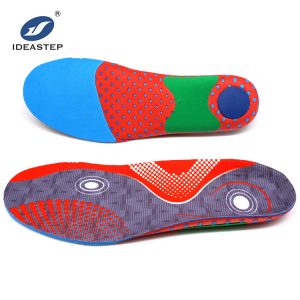
When looking for running insoles with corrective functions, you want to find options that address any specific biomechanical issues or imbalances you may have. Here are some features to consider:
1. Pronation control
If you overpronate (your foot rolls inward excessively) or underpronate/supinate (your foot doesn’t roll enough), look for insoles that provide appropriate support and stability. Look for terms like “motion control,” “stability,” or “anti-pronation” when researching options.
2. Arch support
Choose insoles with proper arch support based on your foot type—high arches generally benefit from more cushioning and support compared to flat feet. Look for terms like “arch support” or “high-arched” when searching for suitable insoles.
3. Heel cushioning
Running can put significant impact forces on the heels, so select insoles that offer ample heel cushioning to absorb shock and reduce stress on the joints and soft tissues.
4. Metatarsal pads
Some runners experience pain or discomfort in the ball of their foot due to high pressure points; metatarsal pads can help distribute weight more evenly across this area, providing relief.
5. Corrective wedges/inserts
Depending on your specific needs, consider running insoles with corrective wedges or inserts designed to correct alignment issues such as leg length discrepancies, supination/pronation problems, or gait abnormalities.
6. Moisture-wicking properties
Opt for materials that promote moisture management, keeping your feet dry during runs and reducing the risk of blisters or fungal infections.
7. Durability
Choose high-quality materials that ensure durability even with regular use and long-distance running.
8. Proper sizing
Select an appropriate size according to your shoe size indicated by the manufacturer’s guidelines; ill-fitting inserts won’t be effective nor comfortable during your runs.
9. Test them out before committing
When possible, try out different brands/models and see which ones feel most comfortable and supportive during your runs. Look for options with return policies or exchange programs to ensure you find the right fit.
Keep in mind that every runner’s needs are unique, so it may be beneficial to consult with a podiatrist or sports medicine professional who can evaluate your gait and provide personalized recommendations for corrective running insoles tailored to your specific biomechanical needs.
If you need running insoles with corrective functions, click here.
